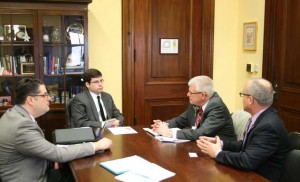Growers Ask For Immigration And Healthcare Reform During Congressional Action Days

Ohio delegates meet with Sen. Portman’s aide, Allen Ernst (center).
Nearly 90 growers, retailers, suppliers and wholesalers attended the Society of American Florists’ (SAF) 2015 Congressional Action Days March 9-10. The delegation, representing 18 states, arrived on Capitol Hill at a time when two major industry issues – immigration and healthcare reform – are especially prominent in national headlines.
The three “asks” that the CAD delegation presented to lawmakers included:
- The implementation of immigration reform that addresses border reform, an improved E-Verify program and acceptable labor solutions, rather than the current House bill (H.R. 1147) that attempts to address E-Verify only.
- Clarification of the definitions of seasonal workers and seasonal employees in the Affordable Care Act (ACA).
- Raising the ACA’s current threshold for full-time employment from 30 hours to the traditional 40 hours per week.
“Having these really specific things to ask for helped a lot this year,” said Mike Mooney of Dramm & Echter in Encinatas, Calif., during the event. “Overall, I think people seemed more open and receptive to our concerns this year.”
Immigration Reform For Agriculture
Congress must enact immigration reform that addresses agriculture’s unique needs and provides realistic ways to maintain a legally authorized workforce. Currently, there is a standalone E-Verify bill in the House of Representatives, H.R. 1147. As an industry, we oppose this bill, dubbed the Legal Workforce Act, and also oppose any agricultural exemption or phase-in time. We support improved border security and an improved E-Verify program, but only when paired with an acceptable agricultural labor solution. Both of the following must also be included in any legislation:
- An adjustment of status to allow us to retain our current, experienced but unauthorized workers. This program should include incentives for agricultural workers to stay in agriculture for several years. Workers should eventually have the option of pursuing residency or maintaining a work visa in or outside of agriculture.
- As a long-term solution, an Agricultural Worker Visa Program to ensure agriculture’s future legal workforce. The visas would be valid for agriculture employers registered through the USDA, distinct from visa programs for the general business community. This program should allow two options:
* An “at-will” visa (a free-market solution), allowing workers to move from a registered employer to another registered employer, without any contractual commitment
* A “contract visa,” where the employer and the worker commit to employment terms, giving both parties increased stability where mutually preferred.
Why not pass E-Verify alone? Growers have no reliable way of knowing if they are hiring legal employees, because they must accept documents that appear genuine. It is very easy for workers to buy fake identification and pass it off as their own to gain employment, and this happens often, according to growers in attendance at CAD. As a result, many trained and trusted employees who have been with a company for years may be unauthorized. A standalone E-Verify bill would only encourage workers to continue to break the law.
Certainly, the current E-Verify system has problems that must be fixed, but most importantly, E-Verify without an agricultural worker resolution will deprive the industry of the workforce it needs, and threaten America’s economy and food security.
“We have been working on immigration reform for at least 15 years, probably more,” said SAF Senior Director of Government Relations Lin Schmale during CAD. “That can seem discouraging, but the important thing is that we are moving the ball forward. If we stop talking about immigration reform, we can be sure Congress won’t pass it. Congress needs to hear from constituents who want immigration reform to pass.”
STARS Act – Treatment Of “Seasonal Employment”
Congress must act to align the definition of what “seasonal” means under the Affordable Care Act.
The CAD delegation asked lawmakers to co-sponsor and pass bipartisan legislation to align what is considered seasonal employment under the ACA. There is currently a bill in the House of Representatives, H.R. 863, the Simplifying Technical Aspects Regarding Seasonality Act (STARS Act. The legislation provides a simple, more accurate calculation for determining seasonal business size, and clarifies that seasonal employment is not full-time employment. STARS would also align the definition of seasonality with the long-standing seasonal employment across varying industries and climates.
Sen. Kelly Ayotte (R-NH) is currently seeking a Democratic cosponsor before she introduces a similar bill in the Senate. This is a great opportunity for bipartisan cooperation, on a topic that is important for many lawmakers.
The breakdown of this issue is that until now, seasonal employees have not been considered full-time under any standard of employment. The ACA does not exclude seasonal workers from employer coverage requirements, as it does for year-round, part-time employees. The ACA’s treatment of seasonal employers puts the horticulture industry at a disadvantage based on circumstances (weather, product demand, etc.) that are beyond our control. The seasonality of most businesses in this industry is not by choice, but rather born from necessity.
Further, the seasonal exception used to determine business size is unnecessarily complicated. Most standards of seasonal employment, including the Treasury Department’s 180 days, exceed the 120-day number contained in the ACA’s seasonal exception. CAD delegates asked members of Congress to reduce the confusion and comply with the 180-day definition in the Treasury Department, and replace the current standard with one that better reflects seasonality across several industries and climates, and that small, seasonal businesses can more easily use to comply.
“Most of the people who are affected by [the seasonal issue] are not large employers,” explained SAF’s Senior Director of Government Relations Shawn Burney, while encouraging CAD attendees to put a human face on the ACA issues. “They don’t have HR staffs or lawyers working for them, and Congress needs to understand what a burden the law’s complicated, confusing aspects have become.”
ACA Definition Of “Full-Time Employment”
Congress must correct the ACA’s definition of full-time employment from its current level of 30 hours per week by replacing it with the traditional 40 hours per week.
The House approved H.R. 30, the Save American Workers Act, on January 8, as one of the first actions of the new Congress. The bill was sent to the Senate for its consideration, but a different version was introduced in the Senate. S. 30, the Forty Hours is Full Time Act, currently has 35 cosponsors, and was introduced on January 6 by Senator Susan Collins (R-ME).
The issue has received significant media coverage and grassroots pressure, and bipartisan legislation in both chambers of Congress is generating headlines.
CAD delegates thanked representatives who voted for H.R. 30, and senators who have cosponsored S. 30. They encouraged senators to support S. 30, reiterating that the ACA’s definition of full-time as 30 hours of service per week does not reflect employers’ workforce needs or employees’ desire for flexible hours. This change is needed to avoid disruptions in the workforce and maintain flexible work options for employees. Aligning the ACA’s definition of full-time employee status with current levels would avoid any unnecessary disruptions to employees’ wages and hours, and would provide significant relief to employers. It would also:
- Make it easier for employers to provide more hours to all employees, increasing their take-home pay
- Help employers offer more generous health coverage to full-time employees, without making premiums prohibitive
- Help ensure that lower-income employees have access to more affordable coverage options
Learn more about SAF’s CAD on the SAF website. Take action on these issues and let your voices be heard in your own congressional districts, and plan on attending the 36th Annual Congressional Action Days, March 14-15, 2016.










